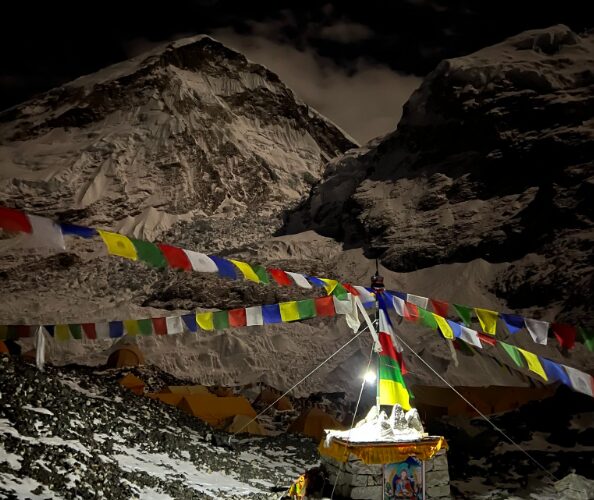The climbing community is reacting to the article published last week by The New York Times, in which Lotta Hintsa of Finland and U.S. physician April Leonardo accused Nirmal Purja of sexual assault.
Influential figures such as Adrian Ballinger and Kilian Jornet, as well as expedition outfitters, women climbers, and some sponsors have spoken up for the women who went public in The Times about their experiences. Meanwhile, Purja has limited comments and blocked the option to be tagged on social media.
American guide Adrian Ballinger was in Chengdu celebrating his Alpenglow group’s success on the North Side of Everest when the news broke. He immediately linked to it.
“I’m choosing to share this article because I believe we need to empower victims to speak out through our support,” he posted on Instagram. “I’m deep enough in this world to have a pretty good sense of where the truth lies.”
Influential climbers’ support
His post immediately drew a large number of comments from other well-known climbers, including Kilian Jornet, who also posted about it:
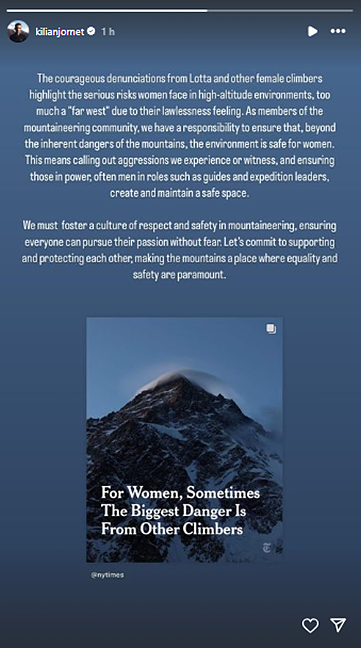
Kilian Jornet’s Instagram story, June 3
Jornet’s 1.5 million Instagram followers, and another influential post by professional skier Cody Townsend, quickly amplified the news.
Other Western outfitters, including Australia-based Climbing the 7 Summits, Austria’s Furtenbach Adventures, and NZ’s Adventure Consultants followed Ballinger within the next 12 hours. All posts suggested that the allegations against Purja are “credible” and supported the “brave” women who spoke out. They also gave their commitment to avoid such events occurring on their watch.
“We can and must create a safe and respectful environment for everyone who entrusts us with their mountain adventures,” Furtenbach’s company wrote.
“We talk about community and taking care of one another but never before have we let part of our family suffer in silence like this,” wrote Garrett Madison. “There are always a lot of firsts on the mountains. This is not one we welcome or can tolerate.”
Not a new problem
But the issue is far from new. Outfitters acknowledge that gender-based harassment or abuse is a real problem in the outdoors.
“It’s time to talk about women in the big mountains,” Caroline Pemberton and Mike Hamill, owners of Climbing the 7 Summits, wrote. “Few women I know haven’t experienced some level of micro-aggressions, harassment, and/or abuse.”
Melissa Arnot, the first American woman to summit Everest without supplementary oxygen and a professional high-altitude mountain guide, has been speaking about this issue for years. It includes her own bitter experience, as she recounted on Instagram today.
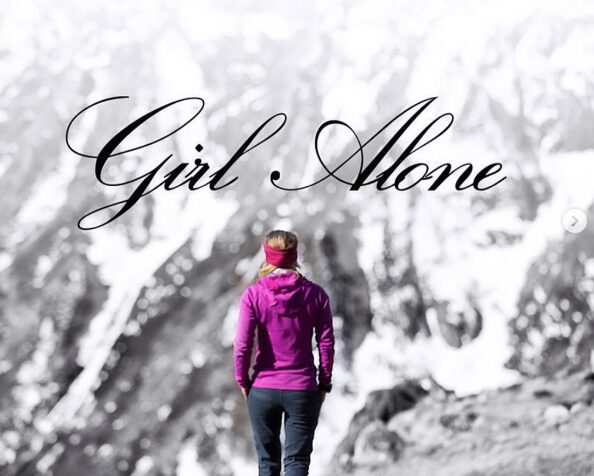
Picture posted by Melissa Arnot today on Instagram
I was often expected to tell the joke or be the joke. Flirt back or be excluded. Go along with it and don’t cause problems. I was called the “total package” by a supervisor as he explained to clients why it was ok to rope up with a young, small girl. And I smiled and played my part.
I regret so much of it now, but at the time it felt like the only way to survive a place I really wanted to be.
AWExpeditions, an outdoor travel operator “for women, by women,” shared their shock at the allegations.
“Unfortunately, we can state with confidence, based on many informal conversations, that this high-profile case is but the tip of the iceberg of a systemic issue in mountaineering,” the company wrote.
Lotta Hintsa, one of the women who spoke out against Purja in the NYT article, has remarks that many women have contacted her to share similar experiences. “It seems like a lot of people have been waiting for this news to break any minute for a really long time,” Hintsa said. “It’s obvious that many know. Now it’s time to speak.”

Canadian photographer and climber Elia Saikaly reacted to the controversy with an image suggesting there’s more to come.
Sponsors
Swedish climber and photographer Emma Svensson asked in a WhatsApp group for around 100 Grivel ambassadors, of which she was one of them, what actions they should take. Grivel is also a sponsor of Nirmal Purja; his name is embossed on their ice axes. She received the following reply from Grivel’s CEO:
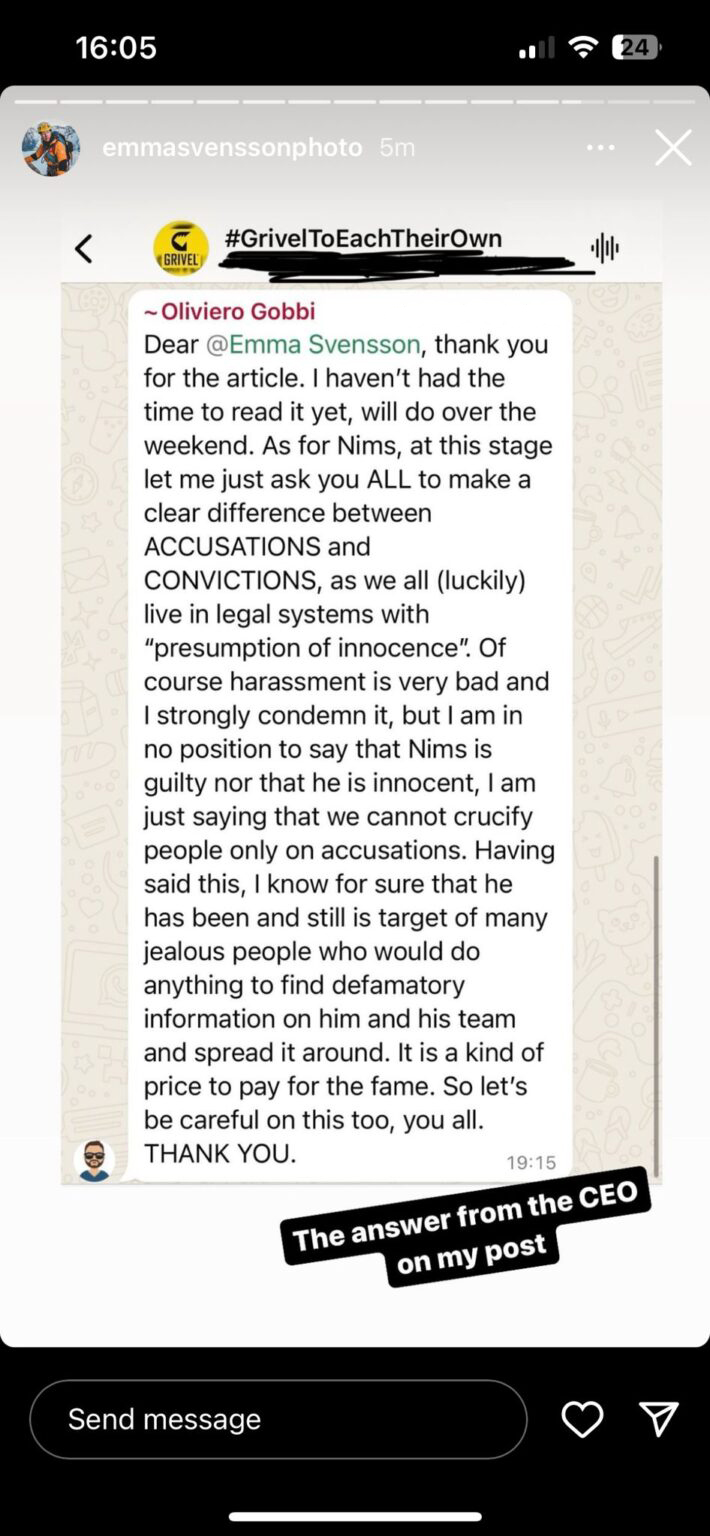
Reply to questions posed by Emma Svensson about the allegations against Purja.
As it happened, Svensson was with Lotta Hintsa when the events happened. “I don’t understand why you think these women would make something like this up?” Svensson replied.
She noted that it is common for women to be accused of lying when confronted with someone else’s word. “I won’t want to be in a team that works with someone as their main profile who sexually assaults women,” she wrote. Then she quit the Grivel ambassador team and published the conversation on her social media.
Backpack manufacturer Osprey took a different stand from Grivel. Today, the U.S.-based company posted the following press release on X:
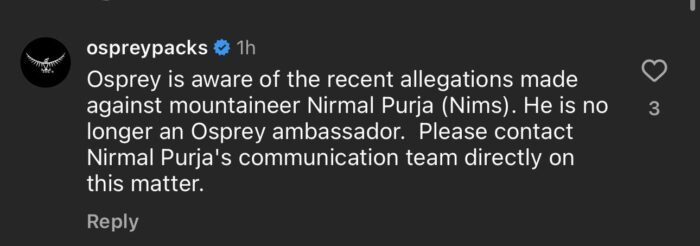
Banned from Nepal?
Nepal’s climbing community members, who traditionally try to avoid public conflict, have not yet made official statements. Local outfitters consulted by ExplorersWeb declined to comment.
However, Rajendra Bajgain, a member of Nepal’s parliament, has demanded that Purja, who was born in Nepal but is now a UK citizen, be barred from entering the country.
“The MP accused him of defaming Nepal by sexually harassing climbers, misusing Nepali citizenship card to climb mountains, and defaming the Sherpa community,” journalist Badra Sharma posted on X.
What’s next?
Some blogs defended Purja after the NYT released its story, based on the presumption of innocence and Purja’s frequent argument that those jealous of his success are trying to bring him down. That argument applied particularly to past controversies about mountaineering tactics and logistics. It is harder to apply to alleged sexual abuse.
